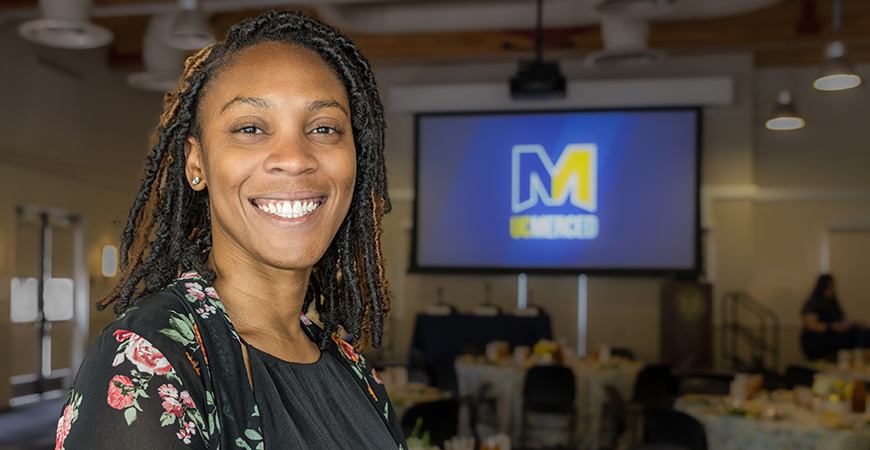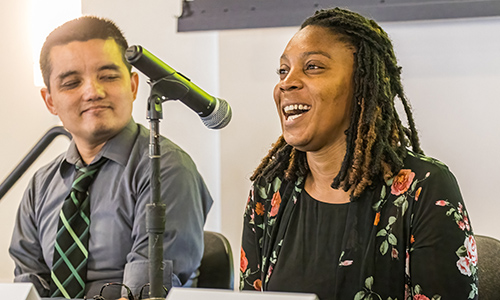
After transferring from a Sacramento community college to UC Merced in 2007, Maxine Umeh-Garcia was unsure of her future career. She admits she hadn’t looked at the majors the newest UC offered before applying and imagined she’d teach high school math.
She met with her academic advisor and learned the campus offered an applied mathematics major, not pure mathematics. They discussed other options and came to a stalemate.
“I remember her saying, ‘Why don't you try being a biology major for a couple semesters and see how you like it?’” Umeh-Garcia said. “I was terrible at biology in high school. I hated it so badly.”
She struggled through some of her classes and wasn’t sure if she had made a wise choice.
Umeh-Garcia said the game-changer for her was taking two classes: a cancer bio class with the dean of the School of Natural Sciences at the time and a neurobiology class with Professor Michael Cleary. During her last year, she performed research in Cleary’s lab, where she obtained substantial neurobiology and data science experience.
After earning a bachelor’s degree in biological sciences in 2010, she decided to stay and pursue a master's degree in Quantitative and Systems Biology with Cleary as her faculty advisor.

After earning her master’s degree in 2013, she continued her graduate studies in the lab of Professor and Vice Chair of Education Research Colleen Sweeney at UC Davis, where she worked on several projects with the main theme of triple negative breast cancer.
“I got interested in triple negative breast cancer research because it has higher incidence and death rates in African American women,” Umeh-Garcia said. “It was very important to me as an African American woman, and also because there's a lack of therapy options for women with triple negative breast cancer, and the cancer itself tends to be more aggressive compared to other types of breast cancers.”
After completing her Ph.D. in Biochemistry, Molecular, Cell and Developmental Biology with an emphasis in translational research in 2019, Umeh-Garcia became a postdoctoral fellow at Stanford University in the Department of Neurosurgery.
I can't tell you how many times I’ve sat down to write a fellowship and they ask you to tell your story, and so many pieces of my story tie back to UC Merced.
“The project I’m working on is focused on trying to understand breast cancer cells that metastasize (a cancer term meaning to travel) to the brain and form a new tumor. There's been research that shows that normal brain cells can communicate or interact with tumor cells, but we don't understand if they are helping the tumor cells to grow faster, or they are stopping the tumor cells,” she said. “We have a body immune system, and we have a brain and nervous system immune system. For a long time, it was thought these are separate and they don't communicate. Now, we know they do, and it probably affects cancer.
“Through my project, I am trying to understand how cancer cells, brain cells and immune cells talk to each other, and if/how this communication affects brain tumor growth and how patients respond to cancer treatments. “
Umeh-Garcia was promoted to an instructor position in her department after receiving a major career development award from the National Cancer Institute (K99/R00), which will fund the remainder of her postdoctoral research and provide three years of funding for her to establish her own independent research lab.
“I can't tell you how many times I’ve sat down to write a fellowship and they ask you to tell your story, and so many pieces of my story tie back to UC Merced,” she said. “My experiences at UC Merced inspired me to pursue cancer research and dig more into the data.”
Cleary is happy to be a piece of Umeh-Garcia’s success story.
“The most rewarding part of my job is seeing former students achieve their goals,” Cleary said. “I’m not surprised by Maxine’s success; she has all the qualities of a great scientist: a passion for making discoveries, a tenacious work ethic, an ability to collaborate with and help others, and a commitment to inspiring future generations of scientists.”
Umeh-Garcia said she’s begun applying for faculty positions and looks forward to starting her own research lab soon.
“It’s cool to think about coming full circle: to have the opportunity to have my own lab and teach and mentor students and give back all that was given to me,” she said. “I really found myself at UC Merced. That's why I feel like it stays so near and dear to my heart.”




